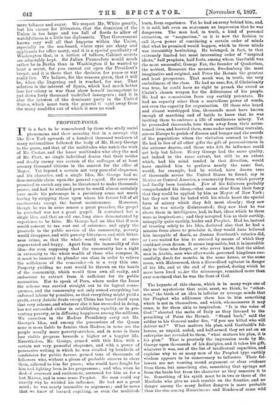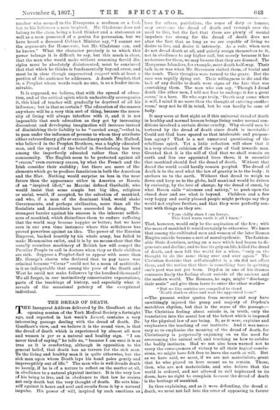PROPHET-FOOLS.
IT is a fact to be remembered by those who study social phenomena and their meaning that in a corrupt city like New York upwards of a hundred thousand workmen of many nationalities followed the body of Mr. Henry George to the grave, and that of the multitudes who watch the wink of Mr. Croker, and the lesser multitudes who obey the nod of Mr. Platt, no single individual denies that their reviler and deadly enemy was certain of the suffrages of at least seventy thousand citizens in the contest for the office of Mayor. Yet beyond a certain not very powerful eloquence, and his character, and a single Idea, Mr. George had no demonstrable claim upon the general regard. He never even promised to enrich any one, he threatened to make thousands poorer, and had he attained power he would almost certainly have made his patronage in a pecuniary sense not worth having by stripping those upon whom his favour fell of all emoluments except the barest maintenance. Moreover, though he was in some senses a great preacher, the gospel he preached was not a great gospel. It contained but a single idea, and that an old one, long since demonstrated by experience to be false. Mr. George had an idea that if men would consent to tax rent out of existence, and apply the proceeds to the public service of the community, poverty would disappear, and with poverty bitterness, and with bitter- ness crime, so that the whole world would be at once regenerated and happy. Apart from the immorality of this idea—for even supposing that the community has a right in extremity to the whole wealth of those who compose it, it must be immoral to plunder one class in order to relieve the selfishness of the remainder —it is a very thin one. Property yielding no rent would be thrown on the hands of the community, which would thus own all realty, and endeavour to extract from it sufficient for its public necessities. Not to speak of Peru, where under the Incas the scheme was carried straight out to its logical conse- quences, and the community not only owned everything but enforced labour by penalties, so that everything might yield a profit, every Asiatic State except China has based itself upon that very scheme, and whatever else it has succeeded in doing, has not succeeded either in establishing equality, or in pre- venting poverty, or in diffusing happiness among the millions. We ourselves in the Madras Presidency carry out Mr. George's Idea, and among the possessions of the Queen none is more liable to famine than Madras, in none are the people usually more poverty-stricken, and in none is there less visible progress towards a higher or a happier life. Nevertheless, Mr. George, armed with this Idea, with a certain not very powerful eloquence, and with a power of persuasive writing in which he was rivalled by hundreds of candidates for public favour, gained tens of thousands of followers who, without a gleam of probable success to cheer them, adhered to him for years ; who would have fought for him had fighting been in his programme ; and who, when he died of overwork and excitement, sorrowed for him as for a lost Master, and in some sense Prophet. No man could say exactly why he wielded his influence. He had not a great mind ; he was nearly insensible to argument ; and he never that we know of learned anything, as even the multitude
learn, from experience. Yet he had an army behind him, and, it is said, left even on statesmen an impression that he was dangerous. The man had, in truth, a kind of personal attraction, or "magnetism," as it is now the fashion to call it,—a power of convincing a certain order of minds that what he promised would happen, which to those minds was irresistibly bewitching. He belonged, in fact, to that extremely limited but most interesting order of "inspired idiots," half prophets, half fools, among whom Garibaldi was the most successful, George Fox, the founder of Quakerism, the noblest, Rousseau the meanest, Swedenborg the most imaginative and original, and Peter the Hermit the greatest and least prosperous. That monk was, in truth, the very embodiment of the class. He had no case, for, if Christianity was true, he could have no right to preach the sword as Christ's chosen weapon for the deliverance of his people. He had no commission from any earthly potentate. He had no capacity other than a marvellous power of words, not even the capacity for organisation. Of those who heard and almost worshipped him, thousands must have known enough of marching and of battle to know that he was inviting them to embrace a life of continuous misery. Yet he persuaded thousands, tore them away from their accus- tomed lives, and hurried them, none under unwilling restraint, across Europe to perish of disease and hunger and the swords of the populations whom the visitation aroused to frenzy. He had in lien of all other gifts the gift of persuasiveness in the extreme degree, and those who felt its influence could not help but follow. Henry George had the same quality, not indeed to the same extent, but still to an extent which, had his mind tended in that direction, would have enabled him to perform nearly the same feat, would, for example, had he wished, have drawn tens of thousands across the United States to found, say in Mexico or Central America, a community from which poverty had finally been banished. Few of his followers probably comprehended his ideas,—that seems clear from their fancy that they could be applied by him as Mayor of New York ; but they saw that he hated with his whole heart the special form of misery which they felt most closely ; they saw that he was utterly disinterested; they saw that he was above them in intelligence, had, in fact, ideas which to them were as inspirations ; and they accepted him as their earthly, unhappily quite earthly, leader and Prophet. Had he, instead of trusting solely to his Idea, declared also that he had a mission from above to proclaim it, they would have believed him incapable of death, as Joanna Southcott's votaries did, or Lave waited for him to succeed by means of which they could not even dream. It seems impossible, but it is incredible only to those who forget, or who never knew, that the ablest men in Arabia, men who afterwards governed kingdoms suc- cessfully, dwelt for months in the same house, or the same room, with Mahommed, then a discredited agitator in danger of his life, and at the end of the period, during which he must have lived uLler the microscope, remained more than ever convinced that he was the Sent of God.
The keynote of this charm, which is in many ways one of the most mysterious that exist, must, we think, be "other- ness," the birth of an idea in inferior or average minds that the Prophet who addresses them has in him something which is not in themselves, and which, whencesoever it may come, is for them akin to inspiration. "It is the voice of God !" shouted the mobs of Italy as they listened to the preaching of Peter the Hermit. "Stand back," said the soldier to his General under fire, "if you are killed who will deliver us ?" What matters his plan, said Garibaldi's fol- lowers, as unpaid, unfed, and half-armed they set out on an enterprise not revealed to them, "what matters his plan, it is his plan." That is precisely the impression made by Mr. George upon thousands of his disciples, and it takes his gift, whatever it was, out of the list of intellectual capacities, and explains why to so many men of the Prophet type earthly wisdom appears to be unnecessary to influence. Their fol- lowers are not wanting sound argument or clear evidence from them, but something else, something that springs not from the brain but from the character as they conceive it to be. Something of his spirit must be in two or three of the Moollahs who give us such trouble on the frontier, and no danger among the many Indian dangers is more probable than the rise among Mussulmans and Hindoos of some wild
teacher who seemed to the Europeans a madman or a fool, but to his followers a man inspired. Mr. Gladstone does not belong to the class, being a hard thinker and a statesman as well as a man possessed of a genius for persuasion, but we have heard a deceased Cabinet Minister say, "I cannot see the arguments for Home-rule, but Mr. Gladstone can, and he knows." What the character precisely is to which this power belongs it is difficult to say, but this much is clear, that the man who would make without reasoning fervid dis- ciples must be absolutely disinterested, must be convinced that that which he thinks is fundamentally beyond error, and must be in close though unperceived rapport with at least a portion of the audience he addresses. A dumb Prophet, that is, a Prophet whose words reach no one, is as a leader incon- ceivable.
It is supposed, we believe, that with the spread of educa- tion, and of the critical spirit which undoubtedly accompanies it, this kind of teacher will gradually be deprived of all his influence; but is that so certain P The education of the masses anywhere will be a very thin sort of thing, because the neces- sity of living will always interfere with it, and it is not impossible that such education as they get by increasing discontent and developing imagination will increase instead of diminishing their liability to be "carried away,"—that is, to pass under the influence of persons to whom they attribute either extraordinary gifts or extraordinary minds. Mr. Halhed, who believed in the Prophet Brothers, was a highly educated man, and the spread of the belief in Swedenborg has been among the imperfectly educated rather than the true commonalty. The English seem to be protected against all "crazes," even currency crazes, by what the French and the Irish consider their stolidity ; but there are more of the elements which go to produce fanaticism in both the American and the Slay. Nothing would surprise us less in the near future than the appearance either in America or Russia of an "inspired idiot," as Mazzini defined Garibaldi, who would insist that some simple but big idea, religious or social, would, if accepted, be the salvation of mankind, and who, if a man of the dominant kind, would shake Governments, and perhaps civilisation, more than all the Socialists and Anarchists have succeeded in doing. The strongest barrier against his success is the inherent selfish- ness of mankind, which disinclines them to endure suffering that the world may become happier or better; but we have seen in our own time instances where this selfishness has proved powerless against an idea. The power of the Russian Emperor, backed heartily by his whole army, has failed to make Memnonites enlist, and it is by no means clear that the usually resistless machinery of British law will compel the Peculiar People to call in doctors when they or their children are sick. Suppose a Prophet-fool to appear with more than Mr. George's charm who declared that to pay taxes was criminal because " Cmsar " could not be a noun of multitude, is it so indisputable that among the poor of the South and West he could not make followers by the hundred thousand P We all forget, in our instinctively conservative expectations, parts of the teachings of history, and especially what it reveals of the occasional potency of the exceptional individual.























































 Previous page
Previous page